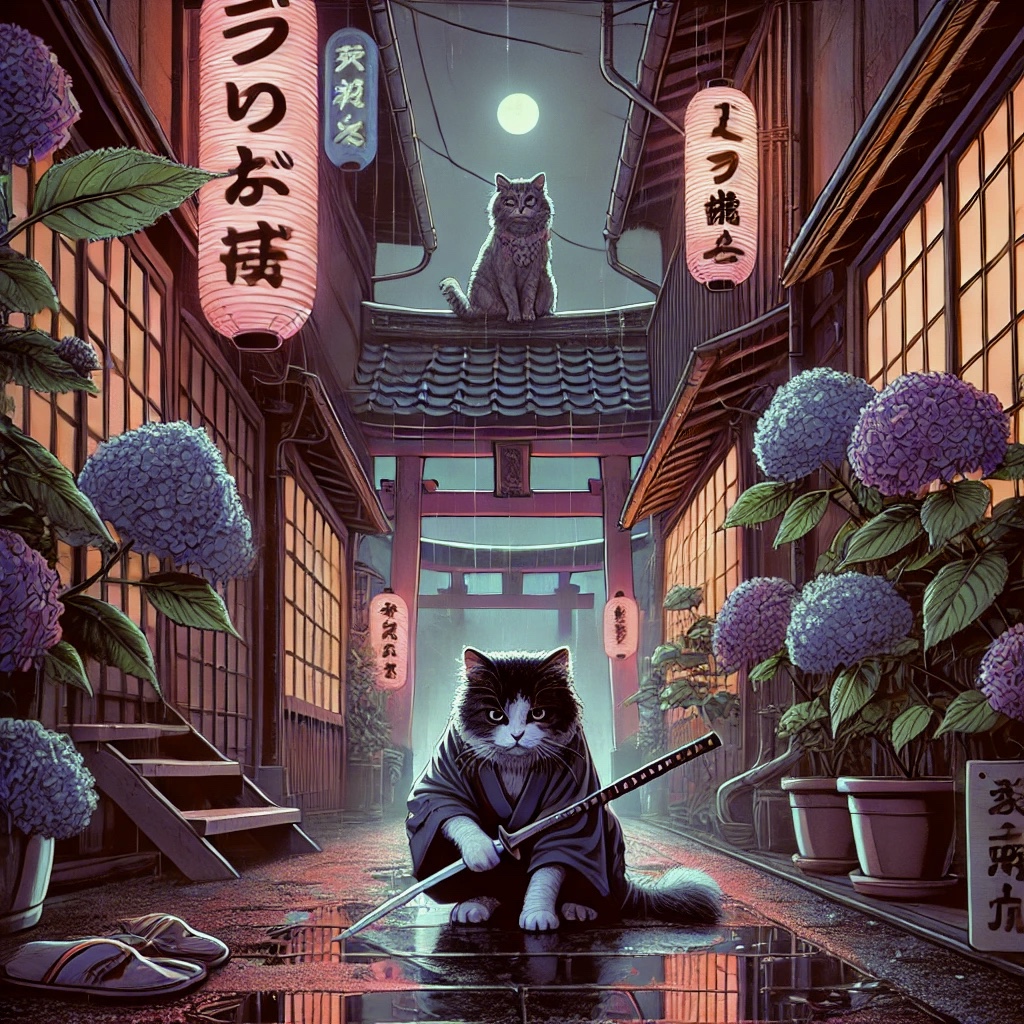Minamoto is a city where old traditions get tangled in phone wires and laundry lines, and where history wears a tracksuit. It’s not quite Tokyo, but it has its own flair: lantern-lit alleys, flickering neon kanji, and cats ~ lots of cats. Some of them afflicted with the infamous “Dancing Cat Disease,” a neurological oddity that causes affected felines to stumble, twitch, and spin as though caught between a nightclub and a Noh performance. To the humans of Minamoto, it’s just part of the background noise. But to the cats, especially one called Romeo – it’s a symbol of something much bigger.
Romeo is a samurai cat with a lineage longer than a kabuki curtain call. His ancestors fought in real battles. His claws have never been dulled by a scratching post. He carries a tiny katana at his side, mostly for show, but you’d be a fool to laugh. Unfortunately, the Dancing Cat Disease doesn’t care about pride or posture, and when it hits, Romeo starts tapping and skidding across the rooftops of Minamoto with the grace of a backup dancer possessed by ghosts. But he’s not alone. Enter Juliet, a purebred, cushion-soft heiress to a tuna empire, raised indoors and fluent in three dialects of purr. Juliet has never touched asphalt. She’s never licked anything that wasn’t artisanal. And yet, somehow, she falls for Romeo – fur, sword, dance spasms and all.
Their love is theatrical. It’s doomed. It’s exactly what Shakespeare would have written if he’d owned a cat and spent time in a Japanese alleyway watching two strays lock eyes over a spilled bowl of ramen. Their families disapprove, of course. Romeo’s clan follows bushido. Juliet’s drinks out of gold-plated fountains. But it’s not just a class thing, it’s a city thing. Minamoto itself resists change. Its streets hum with rules, obligations, and quiet resentment. That’s where Baba and Jiji-san come in.
Baba is the city’s auntie. She’s lived through more cycles of love and war than she cares to count. She’s seen what happens when you stay in a house with a drunk husband long enough, he stops seeing you, and you start seeing everything. Baba used to be what Minamoto expected: loyal, quiet, strong in all the ways no one acknowledges. But now, she’s more like a cat oracle. She knows every alley cat’s name, every human’s bad habit, and exactly when to tell someone to stop being a fool. Juliet visits her often, drawn to Baba’s smoky wisdom and biting sense of humor.
Jiji-san is her counterpart, a laid-back tom with a tail like a calligraphy stroke and a past full of misadventures. He doesn’t talk much, but when he does, it’s the kind of thing you write down and pretend you thought of yourself. He’s never belonged to anyone. He claims he once danced with a fox under the moon and that he invented the sideways head-tilt. It’s hard to tell whether he’s joking. But he sees through Romeo like a pane of dirty glass and likes him anyway.
Together, Baba and Jiji offer perspective. Baba knows what it’s like to be trapped in roles; wife, lady, mother and Jiji knows what it’s like to opt out. They watch over the younger cats with something like fondness, and something like exasperation. They see their own choices mirrored back in the chaos. And they both understand that the Dancing Cat Disease, this strange, stigmatized affliction, isn’t a curse. It’s a metaphor. For love. For rebellion. For the awkward beauty of being alive in a world that doesn’t make room for your rhythm.
In the end, Romeo and Juliet don’t die. They don’t ascend into the stars or drown in a koi pond. They just dance. Together. Sloppy, spinning, paws tripping over tail-tips. Their love doesn’t fix the city. It doesn’t change the rules. But it shakes them, just a little. Minamoto still buzzes with obligation and decay. Husbands still come home drunk. House cats still lounge in silken indifference. But now and then, from a high window or a quiet backstreet, you might hear music, tinny, half-imagined and catch two silhouettes moving in sync under the moonlight.
And if you ask Baba what became of them, she’ll shrug and mutter, “Still dancing.”Then she’ll give you some grilled fish and tell you to go home before someone mistakes you for a romantic.
Author’s Note
This piece started with a song. Dire Straits’ Romeo and Juliet has always felt like more than a ballad – it’s a sigh wrapped in guitar strings, a love letter from someone who knows it’s too late. I wondered what that feeling might look like through the smoke and shadows of a city like Minamoto, a fictional mirror of Tokyo’s forgotten corners, where neon meets nostalgia and the cats might be wiser than the people.
I also wanted to write something that poked at familiar shapes, a love story, a tragedy, a satire, and pulled out the threads of Japanese street folklore, kabuki-level drama, and the emotional weight carried by people (and pets) who live between systems. Baba, for example, started as comic relief, but her voice ended up channeling something closer to a commentary on the quiet resilience of women who have lived too long in the background. And the “Dancing Cat Disease” isn’t just a weird neurological tick, it’s a stand-in for every label society puts on what it doesn’t understand.
In the end, this wasn’t really about cats, Shakespeare, or even samurai. It was about how we love each other awkwardly, how we try, how we spin out of rhythm sometimes, and how it’s enough just to keep dancing.
今宵はニャー:禁じられた恋、サムライ、そしてシェイクスピアの幽霊たち
バリー・アシュワース
源本(みなもと)は、古い伝統が電話線や洗濯物のロープに絡まり、歴史がジャージを着て歩くような街だ。東京ほどではないが、独自の魅力がある。提灯の灯る路地、ちらつくネオンの漢字、そして猫――たくさんの猫たち。
その中には、「踊る猫病」と呼ばれる神経疾患に悩まされる猫たちもいる。彼らはまるでナイトクラブと能の舞台の間で揺れ動くように、よろめき、痙攣し、回転する。人間たちにとっては背景の雑音のようなものだが、猫たち、特にロミオにとっては、もっと大きな何かの象徴だった。
ロミオは、歌舞伎のカーテンコールよりも長い血統を持つサムライ猫だ。彼の祖先は実際の戦場で戦った。爪は爪とぎで鈍らされたことがない。小さな刀を腰に差しているが、ほとんど飾りだ。だが、笑う者は愚か者だ。
残念ながら、「踊る猫病」は誇りや姿勢には関係なく、発症するとロミオは源本の屋根の上を、幽霊に取り憑かれたバックダンサーのように、優雅にタップし、滑り始める。だが、彼は一人ではない。ジュリエットの登場だ。
ジュリエットは、純血種で、クッションのように柔らかい、ツナ帝国の相続人。室内で育ち、ゴロゴロの三方言に堪能。アスファルトに触れたことはなく、職人の手によるもの以外を舐めたこともない。
それでも、なぜか彼女はロミオに恋をする――毛皮も、刀も、ダンスの痙攣もすべて含めて。
彼らの愛は劇的で、悲劇的で、まさにシェイクスピアが猫を飼い、日本の路地裏で二匹の野良猫がラーメンのこぼれた器越しに目を合わせるのを見ていたら書いたであろう物語だ。
もちろん、家族は反対する。ロミオの一族は武士道を守り、ジュリエットの家族は金メッキの噴水から水を飲む。だが、それは階級の問題だけでなく、街の問題でもある。源本自体が変化を拒んでいる。
その街の中で、ババとジジさんが登場する。
ババは街のおばさん。愛と戦争のサイクルを数え切れないほど経験してきた。酔った夫と長く一緒にいると、彼はあなたを見なくなり、あなたはすべてを見るようになる。
ババはかつて、源本が期待する「忠実で、静かで、誰にも認められない強さを持つ女性」だった。だが今では、猫の預言者のような存在だ。彼女はすべての野良猫の名前、人間の悪習、そして誰かに「馬鹿なことはやめなさい」と言うべきタイミングを知っている。
ジュリエットは、ババの煙のような知恵と辛辣なユーモアに惹かれ、よく訪れる。
ジジさんはその対極にいる。筆の一筆のような尾を持ち、過去に多くの冒険を経験した、のんびりとした雄猫だ。彼は多くを語らないが、話すときは、それをメモして自分の考えのように装いたくなるようなことを言う。
彼は誰にも属したことがない。かつて月の下で狐と踊ったことがあり、首をかしげる仕草を発明したと主張する。冗談かどうかはわからない。だが、彼はロミオを汚れたガラス越しに見るように見透かし、それでも彼を好む。
ババとジジは、若い猫たちに視点を提供する。ババは役割に縛られることの意味を知っており、ジジはそれを拒否することの意味を知っている。彼らは若い猫たちを、愛情と苛立ちのようなもので見守る。
彼らは、自分たちの選択が混沌の中に映し出されるのを見ている。そして、「踊る猫病」という奇妙で汚名を着せられた病気が、呪いではなく、愛、反抗、そして自分のリズムに合わない世界で生きることの不器用な美しさのメタファーであることを理解している。
最終的に、ロミオとジュリエットは死なない。星に昇ることも、鯉の池で溺れることもない。ただ、一緒に踊る。
不器用に、回転し、足が尾に絡まりながら。彼らの愛は街を修復しない。ルールを変えることもない。だが、それを少しだけ揺るがす。
源本は依然として義務と腐敗でざわめいている。夫たちは酔って帰宅し、家猫たちは絹のような無関心でくつろいでいる。だが、時折、高い窓や静かな裏通りから、かすかな音楽が聞こえ、月明かりの下で二つの影がシンクロして動いているのが見えるかもしれない。
そして、ババに彼らがどうなったか尋ねると、彼女は肩をすくめ、「まだ踊ってるわ」とつぶやく。そして、焼き魚をくれて、「誰かにロマンチストと間違われる前に、家に帰りなさい」と言うだろう。
著者の注
この作品は、一曲の歌から始まった。ダイアー・ストレイツの「ロミオとジュリエット」は、ただのバラード以上のものに感じられる――ギターの弦に包まれたため息であり、遅すぎることを知っている誰かからのラブレター。
私は、その感情が、ネオンとノスタルジアが交差し、猫たちが人間よりも賢いかもしれない、日本の忘れられた街角のような架空の都市、源本の煙と影を通してどのように見えるかを考えた。
また、馴染みのある形――ラブストーリー、悲劇、風刺――を突き、そこから日本のストリートフォークロア、歌舞伎レベルのドラマ、そしてシステムの狭間で生きる人々(とペット)が背負う感情の重みの糸を引き出すようなものを書きたかった。
例えば、ババは最初はコミックリリーフとして始まったが、彼女の声は、長い間背景に生きてきた女性たちの静かなレジリエンスへのコメントのようなものになった。そして、「踊る猫病」は、ただの奇妙な神経的なチックではなく、社会が理解できないものに貼るすべてのラベルの代役だ。
結局、これは猫やシェイクスピア、あるいはサムライについての話ではなかった。これは、私たちがどのように不器用に愛し合い、試み、時にはリズムを外し、それでも踊り続けることが十分であるということについての話だった。


Leave a Reply